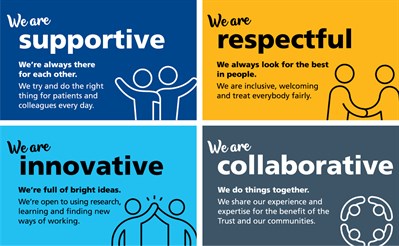Living the Trust Values
Our Trust values are:

Our service strives to actively embody these values.
Supportive
- All team members are well supported through a robust
supervision structure including formal 1:1 clinical
supervision every six weeks, peer supervision sessions every eight
weeks, and informal ad hoc supervision as required. Our team
members value these opportunities to seek support from mentors and
peers, to share ideas, and to address clinical, professional, and
personal topics
- All team members are encouraged to create a wellness
action plan to share with their supervisor. This provides
an opportunity to open a conversation around wellbeing, including
identifying any individual early warning signs or triggers, and
discussing what support is needed for each team member to stay
mentally healthy at work
- We hold virtual fortnightly whole service
huddles to support team members across sites by cascading
information, problem-solving issues, and celebrating successes
within the team
- Each clinical specialty team within our service holds
6-weekly pathway specific meetings to review
projects, provide a forum for group reflection, and reflect on
complex clinical cases
- We also hold bi-annual whole service meetings
to discuss service development priorities and plans, hear updates
from each pathway, and discuss service level issues
Respectful
- A core part of our role is to support patients
with communication difficulties in making their needs, wants,
values and beliefs known. This might include using our
specialist knowledge to support patients with language difficulties
make decisions about their care, or supporting the early use of a
speaking valve or in-dwelling voice prosthesis for patients with
tracheostomies or laryngectomies. We believe that good
communication is the foundation of promoting dignity in
healthcare
- We are actively committed to inclusion in
everything we do for patients, staff members and the public. Our
operational team lead is leading on EDI advocacy across the
Therapies department to ensure we are creating an inclusive team
where everybody can thrive
- We respect the opinions and ideas of all team members and
regularly seek feedback via pathway meetings, huddles, surveys,
supervision, and feedback boxes based on all sites. We aim
to ensure that the voice of every team
member is heard
Innovative
- In 2023, we launched a team based within front door
services (A&E and assessment units) across UHBW
sites. Early results indicate that this is helping the right
patients get the right care at the right time. This is a new area
of specialism for the profession so we have founded and are
chairing a national clinical excellence network for speech and
language therapists working in front door services to share
learning more widely.
- Our speech and language therapy team based at the Bristol
Haematology and Oncology Centre (BHOC) have been working with
colleagues in other major NHS Haematology centres
to share clinical experience of swallowing and
communication disorders in patients with haematological
conditions. To share this more widely, we have
written an article on this speciality for our SLT professional
Bulletin, available here and are now devleoping this into a
research project
- We are excited to be part of a new regional ECMO
service based at the Bristol Royal Infirmary. ECMO is
a specialist treatment providing additional respiratory support to
critically unwell patients and is only provided at a small number
of hospitals throughout England. Our team will be supporting
swallowing and communication for patients undergoing ECMO as part
of their critical care admission
- We have a rolling weekly in-service training
programme to ensure we are delivering high
quality, evidence-based care for our patients. All team members
contribute to share learning from continuing professional
development activities and service development projects
- We have supported two junior team members through
the Healthcare Leadership Academy
scholarship (aimed at therapists within their first
five years of qualifying) as part of our ethos of encouraging
frontline leadership. They both completed and presented innovative
service-wide development projects to improve the care we give our
patients. See here for more details
- A critical care communication chart was developed
by our Weston team in collaboration with Widgit - a
company that specialises in products that use symbols to support
text, helping people read, understand and communicate. The project
was born out of a desire to support medical staff communicate with
critically unwell patients at the beginning of the Covid-19
pandemic and has received international recognition and been
downloaded many thousands of times. See here for more details
- In response to our 2020 organisational merge between Bristol
and Weston, we started a bi-monthly
newsletter to help create a sense of being one
service across sites. One of our wonderful speech and language
therapy assistants pulls together updates from across the pathways
and features a section where we "meet" a different therapist in
each edition. It has been really well received and other
departments within the Trust are now following suit
Collaborative
- Members of our team are embedded in specialist
multidisciplinary teams across pathways to ensure we are
advocating for our patients and delivering high quality services.
This includes involvement with the South Bristol movement disorders
clinic, Macmillan support clinic, and ENT and Max Fax clinics
- Our operational lead manages the nutrition and
dietetics service, in addition to our speech and language therapy
service. This helps the two services to work
collaboratively, maximise efficiency, and deliver joined-up patient
care
- Our dysphagia lead sits on the Trust nutrition and
hydration steering group alongside representatives from
nursing, dietetics, food policy and catering to develop strategy
and policies relating to nutrition/ hydration throughout the Trust,
as well as promoting the needs of patients with dysphagia to
improve their care
- We have been collaborating with local acute hospitals and
community services to develop a toolkit to support
decision-making and documentation for patients who are eating and
drinking with acknowledged risk. This collaboration aims
to enable smoother transitions and clearer communication for
patients who move between different teams within the
region.